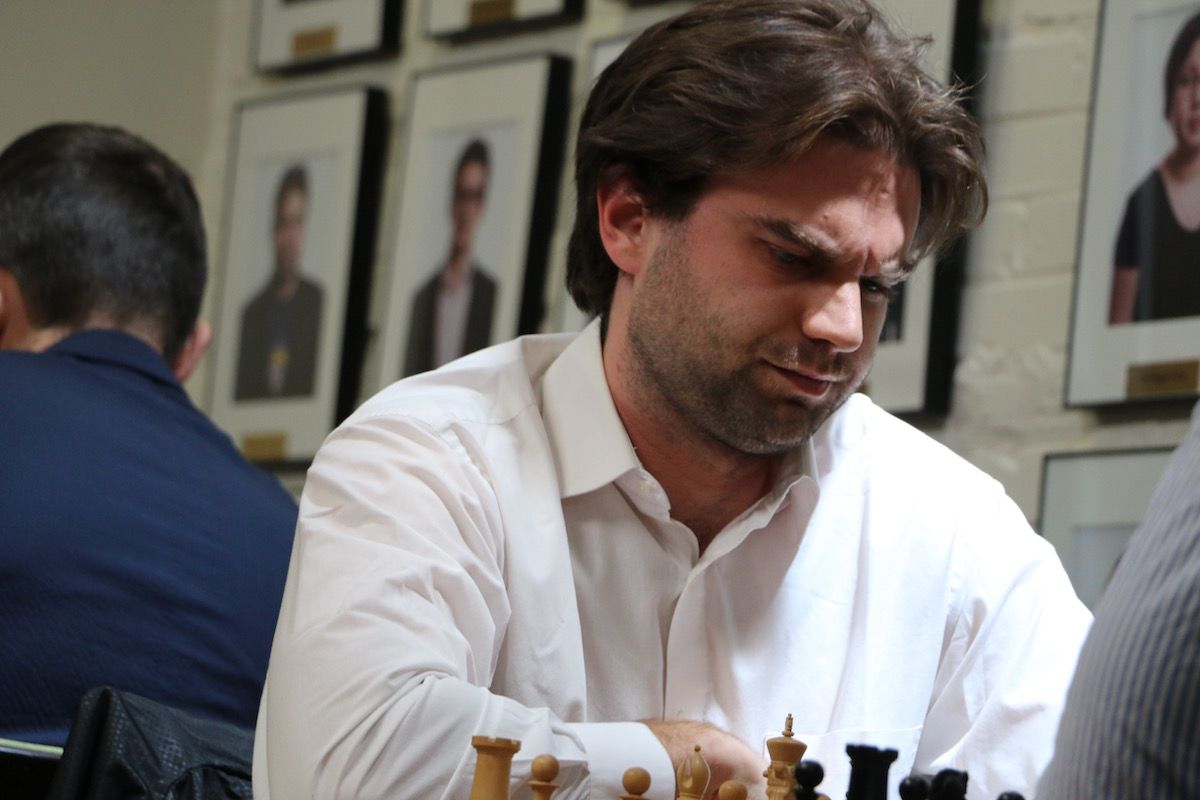
Shankland, Wang Are Surprise Leaders At U.S. Championships
Veal shank is a delicacy in many fine restaurants, and Shankland is still the chef's special at the 2018 U.S. Championships. GM Sam Shankland (6.5/9), playing in his 10th national championship, won again today in the lone decisive game to retake his position at the top of the menu.
The lead is "only" a half-game as GM Fabiano Caruana managed to hold against GM Hikaru Nakamura for a tough handshake. Shankland very nearly had a full-point lead with two rounds remaining, but Nakamura couldn't correctly analyze a sacrificial cruncher.

GM Sam Shankland hasn't been confused much these last nine days. | Photo: Mike Klein/Chess.com.
GM Varuzhan Akobian arrested his three-game skid by drawing GM Wesley So, keeping the defending champion a full point back in lone third and still with long but possible chances. All other players besides the top trio have either been mathematically or practically eliminated.
One big problem for Caruana and So: the leader's final two opponents are currently at the bottom two spots of the tables.

Spanish commentator GM Alejandro Ramirez (left) discusses the day with GM Varuzhan Akobian. | Photo: Mike Klein/Chess.com.
As has become the norm, the ladies produced many more ones and zeros. Today, four more women left winners, bringing the tournament total up to 35 in 54 games. For once, leader WIM Annie Wang (7.5/9) didn't help the overall rate improve (65 percent), but that was just fine.
She drew as Black against the only woman with reasonable chances to catch her, IM Nazi Paikidze (6.5/9). However, the 2016 champ remains the only one who can thwart the 15-year-old's plans. A trio of ladies sit on 5.5/9 but can't really expect to run down both leaders.
Back to the open championship. After trapping GM Yaroslav Zherebukh's bishop and winning the resulting piece-up ending, Shankland broke into the world's top 50. More important, he put some distance between himself and the world number-two.
Should he go 2-0 against his remaining opponents, Shankland will creep over 2700 and become only the seventh American player to do so. You can test your knowledge in the comments by trying to name the other half-dozen.

Chess.com's interview with Shankland.
One board down from Shankland was Caruana. The two stole glances at each other's board throughout the round, but those glances became much more infrequent from Caruana as his position deteriorated.
"It doesn't really matter what [Shankland] does if I lose," Caruana told Chess.com.

GM Hikaru Nakamura nearly got back to 50 percent by beating the top seed, but instead remained winless. | Photo: Mike Klein/Chess.com.
"He just outplayed me and I was just busted out of the opening," Caruana said about Nakamura. "I'm incredibly fortunate just to survive. It keeps my tournament hopes alive."
"If you told me right now I could get 1.5/2, I think it would be a smart bet on my part," Caruana told Chess.com about his finish. "I'll be happy if I get into a playoff with Sam."
When asked about another "bet," that being a Twitter poll where 87 percent of respondents preferred the big three over the field before the tournament began, Caruana thought that imbalance was too high. His "rough estimate" was closer to 65 percent.
Of course, pre-tournament he had a big say in the outcome. Now, he's reliant on GM Awonder Liang (11th) and GM Alex Onischuk (last place) to try to fry the Shank.
So drew Akobian despite the latter inflicting a one-hour time deficit upon himself in the opening. So said he still just tried to play "objective" moves despite his opponent's clock management.

GM Wesley So checks out the field the lazy man's way. | Photo: Mike Klein/Chess.com.
Akobian told Chess.com that he feels that he's been walking into his opponent's home preparation all event. Today, he was also frustrated that So's variation was "in his notes" but he didn't get around to checking the line.
The ladies' event has long since turned into the girls' event, or more exactly, one girl's event. Wang keeps forgetting the gravitas of the stage she's on. Today she had no issues at all fending off her main rival. In fact, Paikidze was the player bailing out into a draw.

WIM Annie Wang took a big step toward her first U.S. women's championship today. | Photo: Mike Klein/Chess.com.
"I'm kind of disappointed I didn't get to play g4 and attack her on the kingside," Paikidze said. "I don't know this opening. I learned it this morning."
She explained to Chess.com that the ...Qa5 and ...Bb4 idea was completely new to her.
"Clearly a draw is unpleasant." It wasn't just the result, it was the act of acquiring it.
The players had already repeated the position three times, but had yet to reach move 30. In this circumstance, one can still claim a draw, but you have to seek the permission of the arbiter.

IM Nazi Paikidze, with no desire to go back to the procedures of grade school. | Photo: Mike Klein/Chess.com.
Wang told Chess.com she didn't claim it because she was unsure of the procedure. Paikidze had a different reason. She knew the process perfectly, but thought it is a bit demeaning to have to summon the arbiter and ask for approval. She likened it to a student having to ask a teacher to use the restroom.
Eventually the fourth repetition also landed on move 30, and the players just called it a day, on their own.
So why did Paikidze play a new opening learned just this morning for the biggest game of the tournament?
"She tends to repeat lines so I thought I could catch her," Paikidze said. She may have also been a victim of reading these reports.
Yesterday, Wang's coach GM Melikset Khachiyan was quoted on Chess.com. He described some of the things he'd been working on with his student. It seems the case was important.
This writer meant to indicate the past perfect tense. Khachiyan was not actively working with Wang at this tournament; all of their work came prior to St. Louis. He was not prepping her before each game. Paikidze thought it was present perfect tense, and reasoned she was going up against the GM's assistance. Instead, Wang's been all on her own since arriving.\
Chess.com's interview with Wang.
Media prep is apparently the wrong prep, but Paikidze did like the reference to her love of cats. So like everyone reading, we're glad she got something positive out of these reports.

Speaking of pets, Chess.com learned today that WGM Anna Sharevich's dog "Boogie" from yesterday's report has a famous last name: "Polgar!" It used to be Susan's. | Photo: Mike Klein/Chess.com.
GM Irina Krush rebounded with a win, officially ending WGM Tatev Abrahamyan's chances.
"I was really down in the dumps after yesterday's game," Krush said, explaining that she awoke at 6:30 a.m. Her eyes opened, but that's when the "nightmare" resurfaced.

GM Irina Krush likened the anguish of yesterday's loss to breaking up from a relationship. | Photo: Mike Klein/Chess.com.
She went back to sleep to try to shake the memory of losing a winning position against Wang in round eight. Krush told Chess.com that the loss crept back in her thoughts a little bit during the game today.
"It was just about being able to move on," she told Chess.com. "I feel like I failed about everything -- the game, and coping with how the game went. It's not really a formula for future games."
Krush related the experience to ending a romantic relationship, and the only respite to that anguish being sleep. When she awakened today, the tranquility of unconsciousness ended.
Somehow she fought through all of that to win her game today:
WIM Jennifer Yu's rebound continued. She won her fourth game in a row.

WIM Jennifer Yu played her first VR game ever after the round. It was a chess game, and she opened 1.b4, just like earlier in the tournament. Was it the world's first virtual Orangutan? | Photo: Mike Klein/Chess.com.
"The beginning was just awful," Yu said of her early rounds. "I feel like even if I win the rest of my games, I still think it's going to be a terrible tournament...I played like 1500 or 1800 strength."
Yu shares one trait with the leader. Like Wang a few days ago, she didn't know that a norm could be earned in a national championship. Unlike Wang, Yu is already sitting on two IM norms (Could Yu be the first player to earn a final norm in a self-described "terrible tournament"?).
Chess.com will seek clarification on all of the norms as the tournament comes to a close.




The 2018 U.S. Championship and U.S. Women's Championship are twin 12-player round robins from April 18-30. The time control is 40/90, SD/30 with a 30-second increment from move one. You can follow all the action at the official website. Games will be daily at 1 p.m. Central time (11 a.m. Pacific, 2 p.m. Eastern, 6 p.m. UTC). Chess.com is on site and will be bringing you daily reports and video interviews.
Previous reports:
- U.S. Chess Championships Begin in St. Louis
- So Wins At U.S. Championship To Start Title Defense
- So, Akobian Still Perfect At U.S. Champs In Decisive Day 2
- Caruana Joins U.S. Champs Lead As Black Strikes Back
- Izoria Shocks Caruana At U.S. Champs Round 4
- U.S. Championships Cool Down After Scorching Start
- 2 Unlikely Leaders At U.S. Chess Championships
- Caruana Takes Share Of Lead; Wang Unstoppable At U.S. Championships Rd. 7
- Caruana, Shankland Lead U.S. Championship


